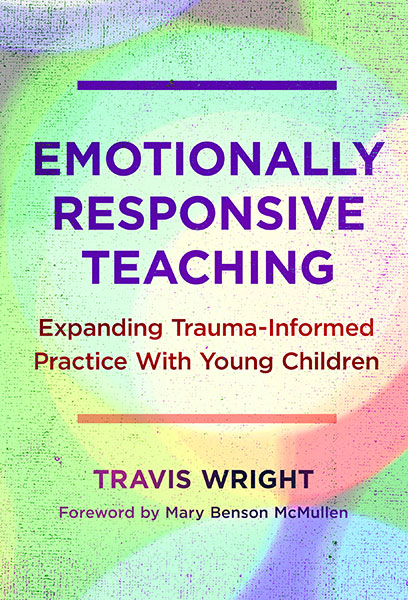Professors: Request an Exam Copy
Print copies available for US orders only. For orders outside the US, see our international distributors.
Foreword by: Mary Benson McMullen
Publication Date: April 28, 2023
Pages: 224
Series: Early Childhood Education Series

“This book offers real hope, inspiration, and practical advice about how to help all of our children move through and beyond perceived threats and betrayals that may otherwise leave them feeling overlooked, outcast, and afraid.” —From the Foreword by Mary Benson McMullen, Indiana University, Bloomington
Learn how to navigate the challenging terrain of connecting with a child who is deeply afraid, angry, and/or sad.
Framing this work as emotionally responsive teaching (ERT), this book expands current conceptualizations of trauma-informed practice to encompass more broadly the relational demands of supporting young children with challenging life circumstances. The author accomplishes this by (1) arguing that predominant discussions of trauma fail to consider the ways that traumatic responses may facilitate both risk and resilience in children’s lives, (2) describing the impact of traumatic experiences and exposure to chronic stress on children’s development, (3) articulating a framework for ERT, and (4) providing readers with applied strategies for practicing ERT in their classrooms. Throughout, readers are encouraged to transform the systems of oppression that are being manifested through children’s struggles in the classroom.
Book Features:
Travis Wright is an associate professor of education and counseling psychology at the University of Wisconsin–Madison.
“In this book, Travis Wright offers the reader real hope, inspiration, and practical advice about how to help all of our children move through and beyond perceived threats and betrayals that may otherwise leave them feeling overlooked, outcast, and afraid.”
—From the Foreword by Mary Benson McMullen, professor, Indiana University, Bloomington
“Dr. Wright addresses the complex issues involved in working with traumatized children by sharing his deep and authentic connection to the work with his readers. His stories from the field are engaging and meaningful, and they offer a valuable model for responsive teachers everywhere.”
—Lesley Koplow, director, Emotionally Responsive Practice, Bank Street College of Education
Contents
Foreword Mary Benson McMullen ix
Acknowledgments and Dedication xi
Introduction 1
1. Teaching Children With Messy Lives 7
Developing a Shared Perspective 8
Messy Lives as a Context for Development 11
Trauma Is the Symptom, Not the Problem 14
A Conceptual Framework for Thinking More Deeply 16
Summary 21
2. Essential Elements of an Emotionally Responsive Teaching Approach 23
Defining Emotionally Responsive Teaching 24
The Essence of Emotionally Responsive Teaching 30
Development and Emotionally Responsive Teaching 33
The Aims of Emotionally Responsive Teaching 37
The Emotionally Responsive Ethic 39
Summary 40
3. Teaching From Hope Versus Teaching From Fear 43
Self-Fulfilling Expectations 43
Teaching in Treacherous Times 46
We All Teach Our Own Story 57
Summary 66
4. Reframing Resilience for Children With Messy Lives 69
I Keep Me Safe 70
Development Along Alternative Pathways 71
A Developmental Pathways Approach 74
Reframing Resilience 79
Moving Forward 87
Summary 88
5. Redefining Trauma: The Embodied Experience of Threat 91
Sinking in the Pool 91
The Embodied Experience of Threat 95
The Stress Response System 100
Differentiating Brief Stress, Adversity, Toxic Stress, and Trauma 107
Summary 110
6. Too Scared to Learn: The Impact of Fear on Development and Learning 111
A Shift in Worldview 112
Adversity and Learning 118
Summary 137
7. Cultivating Emotionally Responsive Teaching 139
The Anchors of Emotionally Responsive Teaching 140
Summary 168
8. The Courage to Care 171
All Children Benefit From Emotionally Responsive Teaching 172
Sustaining the Emotionally Responsive Teacher 176
Summary 185
References 187
Index 199
About the Author 207
Professors: Request an Exam Copy
Print copies available for US orders only. For orders outside the US, see our international distributors.